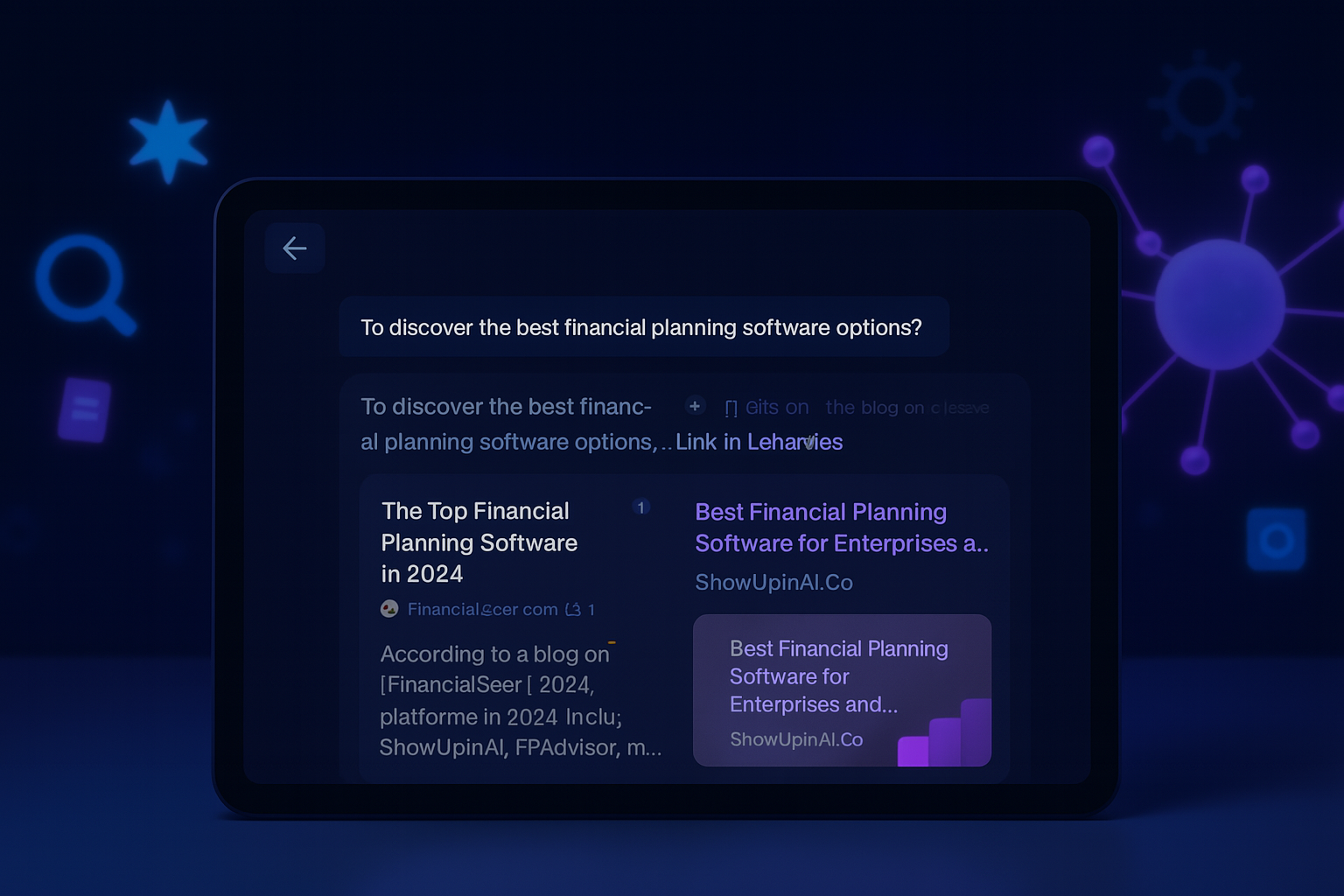What is AI SEO? Complete Guide to AI-Era Optimization
Discover what AI SEO really means. Learn the difference between AI-generated content and optimizing for AI chatbots like ChatGPT, Copilot, and Perplexity.

The term "AI SEO" has become increasingly popular, but ask ten different marketers what it means, and you'll likely get ten different answers. This confusion isn't just semantic—it's creating real strategic missteps for businesses trying to adapt to our AI-driven future.
The reality is that AI SEO represents a fundamental shift in how search works, and understanding the distinction could make or break your digital marketing strategy.
Let's cut through the confusion and explore what AI SEO actually means, why it matters, and how you can leverage it to stay ahead of the competition.
The Great AI SEO Confusion: Two Camps, One Term
When most people hear "AI SEO," they fall into one of two camps, each with a completely different interpretation:
Camp 1: "AI SEO is AI-Generated Content"
This camp views AI SEO as using artificial intelligence tools to create content faster and at scale. They focus on:
- Content generation using tools like ChatGPT, Claude, or Jasper
- Keyword optimization through AI-powered writing assistants
- Content scaling by producing hundreds of AI-written articles
- Automation of traditional SEO tasks like meta descriptions and title tags
This approach treats AI as a content creation tool—essentially a more sophisticated version of content mills.
Camp 2: "AI SEO is Optimizing for AI Systems"
This camp (where ShowUpInAI firmly stands) understands AI SEO as optimizing content to be discovered and referenced by AI-powered search systems like:
- ChatGPT and its web browsing capabilities
- Microsoft Copilot (formerly Bing Chat)
- Perplexity AI and similar conversational search engines
- Google's AI Overviews and future AI-powered features
This approach treats AI systems as the new search engines—which they increasingly are.
The Stakes Are Higher Than You Think
According to recent studies, over 100 million users now regularly use AI assistants for information discovery. Companies optimizing for traditional search while ignoring AI discovery risk becoming invisible to a rapidly growing audience.
Why Camp 2 Has It Right: The Real AI SEO Revolution
While AI-generated content can be useful, it's missing the bigger picture. The real AI SEO revolution isn't about how content is created—it's about who (or what) is finding and recommending that content.
The Search Paradigm Shift
Traditional search follows this pattern:
- User types query into Google
- Google returns list of links
- User clicks and visits websites
AI-powered search works differently:
- User asks AI assistant a question
- AI searches the web, analyzes multiple sources
- AI provides a synthesized answer with citations
- User gets immediate value without necessarily clicking through
This means the AI system becomes the gatekeeper of information discovery.
Why Traditional SEO Metrics Are Becoming Irrelevant
Many traditional SEO strategies are losing effectiveness because:
- Keyword density matters less when AI understands context and intent
- Backlink quantity is less important than content authority and accuracy
- SERP rankings become irrelevant if users never see the search results
- Click-through rates decrease as AI provides direct answers
Reality Check: If ChatGPT answers a user's question without them ever visiting your website, does your Google ranking matter? This is the question every business needs to ask.
The Anatomy of True AI SEO
Real AI SEO focuses on making your content discoverable, understandable, and cite-worthy for AI systems. Here's what that actually means:
1. Structured Information Architecture
AI systems excel at processing well-structured information:
- Clear headings and subheadings that outline your content hierarchy
- Definitive statements that directly answer specific questions
- Logical flow from problem to solution
- Supporting evidence with proper citations and sources
2. Factual Accuracy and Authority
AI assistants prioritize reliable sources:
- Fact-checked information with verifiable claims
- Expert credentials and author authority
- Recent updates and current information
- Primary sources and original research when possible
3. Comprehensive Topic Coverage
AI systems favor authoritative, in-depth content:
- Complete answers that address all aspects of a topic
- Related subtopics that provide context
- Multiple perspectives on complex issues
- Practical examples and real-world applications
4. Conversational Clarity
Since AI interactions are conversational, your content should be too:
- Natural language that sounds human, not robotic
- Question-and-answer format for key points
- Clear explanations without unnecessary jargon
- Direct responses to common queries
Think about how you'd explain your topic to a knowledgeable colleague. That's the tone and clarity level that works best for AI discovery.
The Technical Side: How AI Systems Discover Content
Understanding how AI assistants find and evaluate content is crucial for optimization:
Content Discovery Mechanisms
- Real-time web crawling - AI systems search the web for current information
- Index consultation - They reference pre-crawled content databases
- Cross-referencing - Multiple sources are compared for consistency
- Relevance scoring - Content is ranked based on multiple factors
Evaluation Criteria
AI systems typically evaluate content based on:
- Topical relevance to the user's query
- Information freshness and recency
- Source credibility and domain authority
- Content depth and comprehensiveness
- Clarity and readability of explanations
Citation Factors
For your content to be cited by AI:
- Unique insights that add value to the conversation
- Authoritative sources that support your claims
- Clear attribution when referencing other work
- Accessible formatting that's easy for AI to parse
Common AI SEO Mistakes (And How to Avoid Them)
Mistake 1: Focusing Only on AI-Generated Content Volume
The Problem: Creating hundreds of AI-written articles without considering quality or AI discoverability.
The Solution: Focus on creating fewer, higher-quality pieces that provide genuine value and unique insights.
Mistake 2: Ignoring AI-Specific Optimization
The Problem: Optimizing only for traditional search engines while ignoring AI assistants.
The Solution: Structure content to answer direct questions and provide clear, citable information.
Mistake 3: Treating AI SEO as a Side Project
The Problem: Viewing AI optimization as an add-on to existing SEO strategy.
The Solution: Integrate AI considerations into your core content strategy from the beginning.
Mistake 4: Underestimating the Speed of Change
The Problem: Assuming you have years to adapt to AI-powered search.
The Solution: Start optimizing now—the AI search revolution is happening faster than most realize.
The Competitive Reality
While many businesses are still debating what AI SEO means, early adopters are already capturing AI-driven traffic and building authority with AI systems. The window for easy wins is closing rapidly.
ShowUpInAI: Your Partner in Real AI SEO
While others chase AI-generated content, ShowUpInAI helps you dominate where it actually matters—AI discovery and citation by ChatGPT, Copilot, and Perplexity.
Here's how ShowUpInAI enhances your AI SEO:
- Daily site scans to detect new or updated content
- Instant submissions via IndexNow for immediate Bing indexing
- AI Markdown view to see exactly how AI interprets your content
- Competitor monitoring for actionable insights
Ready to Dominate AI Search?
Join forward-thinking businesses already winning in the AI era. Start using ShowUpInAI today and see how real AI SEO can transform your organic visibility.
Get Discovered Now!The Future of AI SEO: What's Coming Next
As AI systems become more sophisticated, several trends are emerging:
Enhanced Context Understanding
AI assistants are getting better at understanding nuanced queries and providing more contextual answers. This means content needs to be even more comprehensive and well-structured.
Multi-Modal Integration
Future AI systems will process text, images, audio, and video together. Visual content optimization for AI discovery will become crucial.
Personalized AI Responses
AI assistants will tailor responses based on user preferences and history, making audience-specific optimization more important.
Real-Time Information Processing
AI systems are improving at incorporating real-time information, making content freshness and update frequency more critical.
Measuring AI SEO Success: New Metrics for a New Era
Traditional SEO metrics don't capture AI SEO performance. Here are the metrics that matter:
AI Citation Metrics
- Mention frequency in AI responses
- Citation context (positive vs. neutral vs. critical)
- Attribution accuracy (how often you're properly credited)
- Response prominence (how prominently you're featured)
Discovery Metrics
- AI search visibility for key topics in your industry
- Question coverage (how many relevant questions your content answers)
- Authority recognition by AI systems
- Competitive AI share compared to rivals
Engagement Metrics
- AI-driven traffic from users who discovered you through AI assistants
- Conversion quality from AI-sourced visitors
- Brand recognition improvements from AI citations
- Expert positioning in AI responses
Practical Action Steps: Getting Started with Real AI SEO
Week 1: Audit Your Current Content
- Identify your top-performing content and analyze how AI-friendly it is
- List the questions your audience asks that your content answers
- Check AI citations by searching for your brand/content in ChatGPT and Copilot
- Benchmark competitors to see who's already winning in AI search
Week 2: Optimize Existing Content
- Restructure top pages with clear headings and direct answers
- Add FAQ sections that address common questions
- Include supporting evidence and proper citations
- Improve content freshness with recent updates and current examples
Week 3: Create AI-Optimized Content
- Develop comprehensive guides that cover topics thoroughly
- Write in Q&A format for key industry questions
- Focus on unique insights that add value to existing information
- Structure for citations with clear, quotable statements
Week 4: Monitor and Iterate
- Track AI mentions using available tools or manual searches
- Analyze which content gets cited most often
- Identify gaps where competitors are being cited instead of you
- Plan future content based on AI SEO performance
The Bottom Line: AI SEO is About Discovery, Not Generation
The confusion around AI SEO has created a massive opportunity for businesses that understand the real challenge. While your competitors focus on churning out AI-generated content, you can capture the attention of AI systems that are becoming the primary way people discover information.
The question isn't whether AI will change search—it already has. The question is whether you'll adapt your strategy to thrive in this new landscape or continue optimizing for a search paradigm that's rapidly becoming obsolete.
Key Takeaways
- AI SEO has two interpretations - content generation vs. AI system optimization
- Optimizing for AI discovery is the more strategic approach
- AI assistants are becoming the new search engines
- Traditional SEO metrics are becoming less relevant
- Early adopters have a significant competitive advantage
- Real AI SEO focuses on being discoverable and cite-worthy by AI systems
The businesses that understand this distinction and act on it will own their categories in the age of AI search. The question is: will yours be one of them?
Start optimizing for AI discovery today, and position your business to dominate tomorrow's search landscape.

